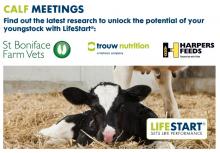More research than ever is going into calf nutrition and how differences during the first weeks of life can have a significant impact on the productivity of these animals over their lifetime. The effect of the environment and external factors on the expression of genes has long been studied in human medicine. Termed metabolic profiling, the scope to affect gene expression is mostly limited to early life. An example of this is seen when an increase of 100g average daily weight gain is achieved during the first 8 weeks of life, when feed conversion efficiency is at its highest. This change can result in an extra 250kg of milk over the first lactation. Therefore, understanding the gold practices for calf nutrition can have huge benefits for your farm.
As well as optimising nutrition, the environment is very important in limiting disease pressure on your calves. Appropriate ventilation is critical for calf housing to improve calf comfort, growth rates and reduce disease risk. Combined with vaccination programmes tailored to fit with your system, calf health can be maximised.
Fever tags may be another tool you might want to consider to minimise losses and reduce antibiotic use. They sit within the calf’s ear and will flash red if it’s temperature rises above 39.7. This is often before the calf shows any outward signs of illness and can prompt earlier intervention with an anti-inflammatory and so treatment is initiated as early as possible.
To discuss calf health, please call the practice and speak to a member of the farm team - 01363 772860 (option 2).


